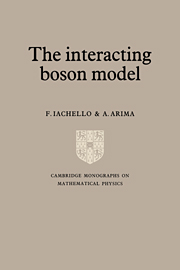3 - Geometry
Published online by Cambridge University Press: 05 November 2011
Summary
Introduction
The interacting boson model has associated with it an intrinsic geometric structure. This is a property of all models with a definite group structure G, since each group has associated with it both an algebra g and a topology G. The natural space for the geometric properties of a system with group structure G is the so-called coset space. The concept of a coset space is discussed in detail in the book by Gilmore (1974). Gilmore and Feng (1978) introduced it in nuclear physics through applications to the Lipkin model. Several authors have used it in connection with the interacting boson model, since the almost-simultaneous publication of three articles by Bohr and Mottelson (1980), Ginocchio and Kirson (1980) and Dieperink, Scholten and Iachello (1980).
The geometric properties of the interacting boson model are particularly important since they allow one to relate this model to the description of collective states in nuclei by shape variables introduced in the early 1950s by Bohr and Mottelson (Bohr, 1952; Bohr and Mottelson, 1953; Bohr and Mottelson, 1975).
The crucial ingredients in the study of geometric properties of the interacting boson model are the coherent (or intrinsic) states. There is a large variety of problems that can be attacked with these states, both of static and dynamic nature. Here, we confine ourselves to only a few of these.
Cosets and coset spaces
Given a group G, with algebraic structure g, there is a straightforward mathematical procedure by means of which one can attach geometric spaces to it.
- Type
- Chapter
- Information
- The Interacting Boson Model , pp. 99 - 128Publisher: Cambridge University PressPrint publication year: 1987

